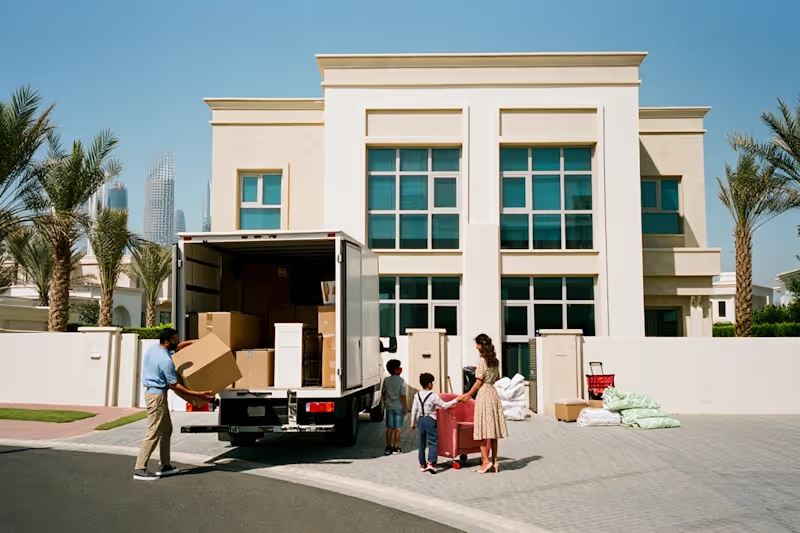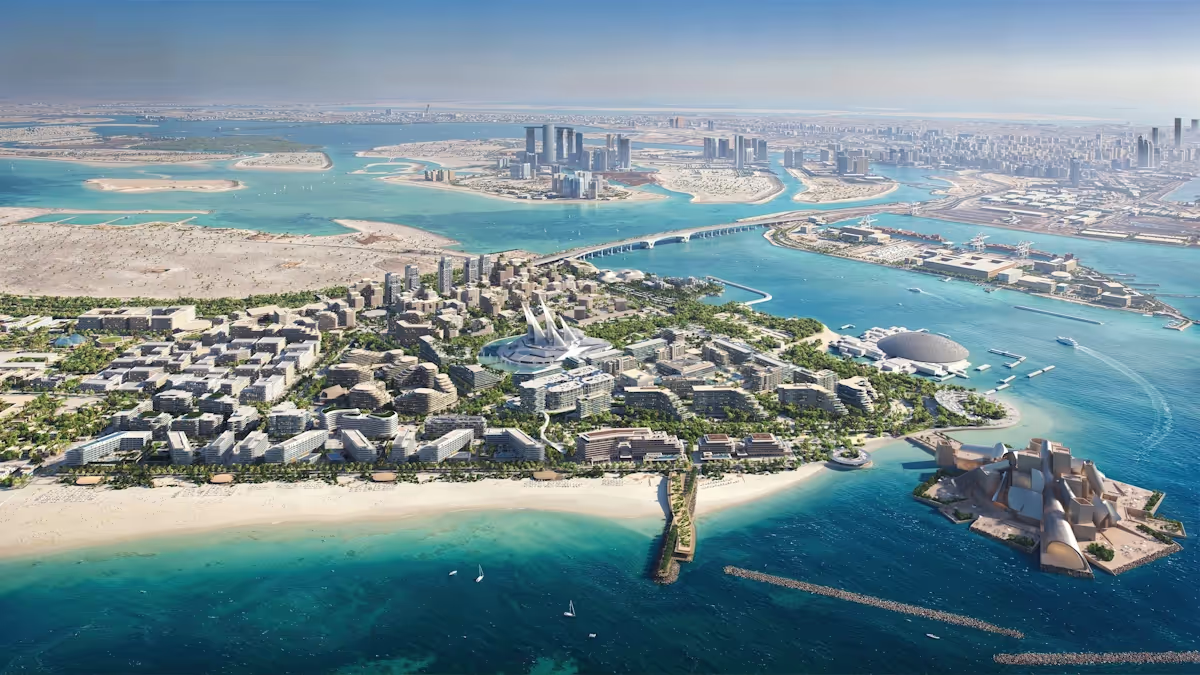How to choose an investment property in Abu Dhabi
The United Arab Emirates offers many prospects and advantages to foreign investors. Traditionally, Dubai has been the most sought-after destination for expats, but during the past few years, the emirate of Abu Dhabi has also been gaining popularity with investors from all over the world. The local real estate market offers a wide range of residential and commercial properties both in budget-friendly and premium segments. For your investment to pay off, it's important to understand the smallest nuances of this type of investment. Below we will tell you how to choose an investment property and accurately assess the profitability of your assets.
Choosing a Trustworthy Developer
The efficiency of your investment depends directly on the reputation of the developer. When buying an investment property, it is important to choose a large, financially stable company with a decent business reputation so that you can protect yourself against delays, project freezing, or failure of the building to meet the stated criteria. Currently, the lion's share of the Abu Dhabi property market is occupied by the major national developers.
NBD! The Department of Municipal Affairs (DMA) is in charge of all matters regarding the legal regulation of the emirate's real estate market.
The legal status of investors also needs to be looked at before investment. The experience during the economic downturn in 2007–2008 showed a significant insecurity for expats involved in off-plan projects, a significant proportion of which were delivered late or frozen altogether.
In 2015, Abu Dhabi established the Real Estate Regulatory Act No. 3, which clearly regulated development procedures and the rights and obligations of parties in the event of unforeseen events. In particular, as of 2015, all developers are required to:
- Provide investors with a development plan.
- Obtain a construction permit from the DMA.
- Open an escrow account in which all funds received from investors will be deposited.
In terms of the last point, the escrow account is held in trust by the DMA or an authorised bank. A separate account must be opened for each project. As a rule, payments to contractors and project consultants can be made from this account. The developer's general overhead costs, as well as the funds required to purchase the land plot cannot be paid from the deposited funds. The developer will only have access to the account once the construction phase specified in the contract has been completed. Moreover, the trustee will continue to withhold 5% of the total assets received from the developer for 1 year after the project is commissioned. If the project does not meet the stated standards, these funds will be used to locate and remedy defects in the building or the project.
To choose a reliable developer it is recommended to follow these points:
- Research all the available information – the developer's official website and its current social media accounts. You have to pay attention to customer reviews and comments, how long the company has been operating in the Abu Dhabi real estate market, whether it has been awarded any accolades and who are its partners. Useful information on the pros and cons of the specific real estate developer can also be found in the thematic forums.
- Take a look at the company's portfolio – see how many projects have been completed and how many are still under construction, and check for news on construction delays.
- View one or more completed projects. A tour can be arranged with the help of a licensed real estate agent.
Which Type of Property is Best to Invest in?
There is no clear answer to this question. The choice of a particular type of property depends on your budget and the expected location of the residences. For example, in sought-after areas, such as Al Reem Island and Yas Island, premium 1 and 2-bedroom apartments are the most popular. In the first half of 2022, tenants opting for affordable properties favoured the Al Ghadeer and Masdar City areas. In contrast, residents of Al Raha Gardens chose spacious 4-bedroom villas. The appeal of a particular property depends primarily on its location and the category of tenants you intend to interest.
NBD! An investment property should be suitable for a number of tenant categories, such as business professionals and families. In this case, the chance of downtime and loss of income will be noticeably lower.
You will also have to make a choice between completed and off-plan projects. For one thing, real estate under construction is not as costly, especially compared to buildings already in operation. On top of this, the majority of developers offer interest-free instalments when buying off-plan properties. On the other hand, you will only be able to start using your property once the construction has been completed, which is not always on schedule. That being said, ready housing is more expensive, but you can take advantage of rental yields as soon as you conclude the purchase/sale contract.
NBD! Purchasing a property under construction allows investors to save 10-30% compared to the current market value of a similar segment of completed property.
How to Calculate Yield
The key indicator of rental yield is ROI, which is a coefficient of return on investment. This helps to determine the profitability of the project. How ROI is calculated:
ROI = (Return on Investment - Net income / Cost of investment) * 100%
First-time investors are frequently guided by the market value and capitalisation of the property. The latter refers to the increase in the value of the building due to changes in market conditions or other external factors. Taking into account the current price of your property is important, but there is no point in putting it at the top of the list. For example, if you were able to buy an apartment which has a value of 10–15% below the market price, but with a low yield, this investment will not bring the desired profit.
NBD! There is no capital gains tax in the UAE. In the case that the property sale is at a higher market value, you will be able to keep 100% of the profit.
Another indicator that is often considered by first-time investors is the gross rate of return (or gross profitability). This reflects the earnings before overheads, i.e. the ratio of rental income to the purchase price of the property. But it does not take into account the costs of property maintenance, major renovations, finding and attracting tenants, and other overheads. You can objectively evaluate the effectiveness of your investment with an ROI calculation.
Let's take a simple example:
You have purchased a 695 sq. ft 1-bedroom apartment on Al Reem Island for AED 580,000 (USD 158,000). The average annual rent for such a property is AED 50,000 (USD 14,000).
Your gross rate of return from owning this apartment would be:
GNP = 50,000 / 580,000 = 0.086 or 8.6%.
Now using the ROI calculation, we will determine the amount of your real income. This will encompass costs such as the registration fee (2% or AED 11 600 (USD 3,158)), brokerage fee (2% or AED 11 600) and maintenance fee for the residence (AED 8 (USD 2) per sq. ft or AED 5,560 (USD 1,513)).
ROI = 50,000 - 5,560 / 580,000 + 11,600 + 11,600 = 44,440 / 603,200 = 0.074 or 7.4%
Regularity of Payments and Dependence on Third Parties
The average full return on investment in Abu Dhabi real estate is 7–9 years. Throughout this period, your property should remain attractive to potential tenants. Factors that are important to consider to avoid downtime and financial loss are as follows:
- Does your advertised rental cost match the current market price?
- Are there any significant social facilities near your property (or planned for construction in the next few years) that could affect the market price of the arena - metro stations, parks, shopping and entertainment centers or other attractions?
- How many residential buildings similar to yours are there in the selected area?
NBD! The amount of rental payments depends not only on the quality and class of the property, but also on its location, the availability of nearby attractions and amenities, and the supply/demand balance for this particular type of residence.
Income is More important than Capital Appreciation
When acquiring a property, professional investors rely primarily on the return on their rental income. Betting on potential capital gains is a risky strategy. Like any other commodity, the market value of real estate depends on the balance of supply and demand. In the long term, it is very difficult to predict the potential appreciation of an asset.
It is important to make sure that your property will be in demand among potential tenants for a long time in order to generate a stable passive income. If the residence was purchased with debt financing, the minimum monthly rental price should fully cover your mortgage payments, including bank interest and all overheads.
Quick Capitalisation of the Investment
Due to the lucrative off-plan property options, some investors aim to acquire properties in the emirate for resale. The UAE's legal system allows foreign investors to dispose of any assets they own at their own discretion.
In most cases, after completion, the market value of projects under construction increases by several times, which allows for quick and substantial capital appreciation. But the 2007–2008 crisis has shown that real estate market trends can change rapidly, especially in the longer term. In the event that the value of your residence starts to drop, you will not only fail to make a profit but also risk losing some of your equity.
NBD! Rents are much more static than property prices. A property that is leased on favourable terms will still generate income, even amidst negative market conditions.
Personal or Borrowed Funds
Mortgage loans for foreigners are common practice in the UAE, as many international and local banks are keen to work with expats. The use of loan funds allows the investor to diversify assets and invest their own funds in stocks, bonds or additional properties.
When buying a residence in a completed building, local lenders are willing to finance up to 75% of the value of the property. The remaining 25% must be paid by the borrower as a down payment. For off-plan properties (where no payment plan is provided by the developer), the down payment is up to 50%.
How Can We Help?
If you want to buy an apartment in Abu Dhabi, the best thing to do is to contact a licensed realtor. Our highly-qualified professionals at Metropolitan Capital Real Estate will help you to understand all the ins and outs of the UAE real estate market and choose the most suitable property for your goals and budget. Our experienced professionals are ready to take care of all the documentary and legal matters, including negotiations with the owner of the apartment, preparation of the necessary documents, support in obtaining a mortgage loan and the registration of the transfer of ownership rights.






